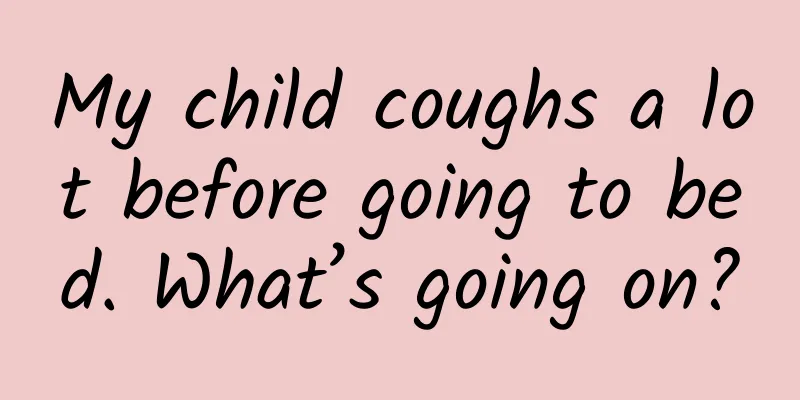My child coughs a lot before going to bed. What’s going on?

|
From the beginning of autumn to the beginning of winter, the number of children who come to the pediatric clinic for repeated coughing has increased significantly. Some of these children do not cough or cough very rarely during the day, but cough violently at night and cannot sleep. So, what is going on? How can it be solved? In this issue, Dr. Wang Xia from the Children's Asthma and Allergy Clinic in the Women and Children's Hospital of our hospital provides scientific knowledge. Causes of nighttime cough in children 01Nighttime coughing may be caused by body position Coughing is a normal protective reflex of the human body, which helps to expel foreign matter and pathogens from the airway to keep the airway open. Most children stand or sit during the day, which makes it easier to expel mucus from the respiratory tract, so they cough less or not at all. When they lie down at night, it becomes more difficult to cough out foreign matter, and coughing increases. If the cough is not severe, does not affect sleep, and there is no other discomfort, there is usually no need to worry too much. Parents need to open windows for ventilation and use humidifiers every day, which is a better solution. Also pay attention to the air quality in the room (whether there is smoking, new decoration) and temperature and humidity. Poor air quality or too dry air in the room may aggravate coughing. 02Nighttime coughing may be caused by disease (1) Cough variant asthma Cough variant asthma is a special type of asthma. Cough may be the only clinical manifestation. It is often an irritating dry cough and often occurs at night and early morning. Symptoms worsen when encountering cold air or eating salty, sweet, cold food and exercising. Antibiotics are ineffective for this type of cough, but bronchodilators are effective. Children with this type of cough often have a personal or family history of allergies. Allergen testing often indicates allergies to mites, mold, pollen, and cat and dog dander. Children diagnosed with cough variant asthma need to be treated according to the principles of asthma prevention and treatment. (2) Upper respiratory tract cough syndrome Also known as postnasal drip syndrome, it can be simply understood as the mucus does not flow out of the nostrils, but drips backwards to the oropharynx, stimulating the cough receptors in the throat and causing coughing. If you are lying flat, the symptoms of postnasal drip will be more severe, so you often cough at night. The causes of postnasal drip are often respiratory infections (rhinitis, sinusitis, etc.), pet hair, dust and mite allergies, foreign bodies in the nasal cavity, etc. Children can often also be accompanied by pharyngitis, chronic tonsillitis, laryngitis, adenoids hypertrophy and other problems. (3) Cough after infection It refers to the persistent coughing symptoms after respiratory tract infection (cold, bronchitis, etc.), usually for more than 3-8 weeks. The mechanism of this cough is related to airway hyperresponsiveness after infection. The mucous membrane of the respiratory tract remains sensitive after infection and is particularly susceptible to cold air, irritating odors, etc., thus causing persistent coughing. It is often caused by infections such as viruses, bacteria, and Mycoplasma pneumoniae, and is more common in autumn and winter. (4) Gastroesophageal reflux cough It refers to the upward reflux of gastric contents and gas that stimulates the cough receptors in the esophagus and trachea, leading to a syndrome with cough as the prominent symptom. It is a special type of gastroesophageal reflux disease. It is easy to occur after eating or when lying flat, and is often accompanied by digestive symptoms such as nausea, vomiting, and upper abdominal pain. How to care for children's night cough? 1. Whether it is night cough or morning cough, the nursing principles are basically the same: adjust the air temperature and humidity, avoid irritating food, drink enough water, pat the back to promote sputum discharge, open windows for ventilation regularly, pay attention to environmental hygiene, and clean up dust and dandruff in the room and on the bed in time. For night cough caused by posture problems, you can try to raise your back a little, or change to side lying. 2. If the child's nighttime cough does not affect sleep and there is no other discomfort, parents can wait patiently and strengthen daily care. It may get better after a while. Try to avoid excessive medical treatment. However, if the child's condition has not been good or the nighttime cough has worsened, it is recommended to take the child to a regular hospital pediatric department to see a specialist doctor in time to avoid delaying the disease. After determining the specific cause of the disease, symptomatic treatment can be given to achieve early recovery. |
<<: What will happen if I take the medicine before meals instead of after meals?
>>: Danger! Are you in the high-risk group that lung cancer "favors"? Check out these indicators!
Recommend
What causes breast lobular hyperplasia
Due to the increase in the incidence of lobular b...
How to use green papaya to enlarge breasts
In life, women all want to have perfect breast sh...
A woman had her breasts completely destroyed after just three operations
Breast cancer is the most common malignant tumor ...
You can stock up on nonsteroidal anti-inflammatory drugs, but don’t take them randomly
This is the 4164th article of Da Yi Xiao Hu After...
Slight abdominal pain and no menstruation
For all the female friends, mental factors, exces...
How to relieve the unbearable pain of breast engorgement
Breast engorgement is most likely to occur during...
What are the feelings and symptoms of the fetus entering the pelvis?
The fetus entering the pelvis is a common phenome...
Does pubic pain in late pregnancy mean early birth?
The closer the due date is in the late pregnancy,...
What to do if you have facial allergies during early pregnancy
Most pregnant women are very happy when they find...
How long after cesarean section can I use a belly belt
After giving birth, a woman's body is relativ...
How much does a colposcopy cost?
A simple colposcopy costs about 500-600 yuan. Bef...
Can women do ani exercises during the confinement period?
People who like sports must know something about ...
Is it normal for women to have stomach pain during early pregnancy?
Gastric problems trouble many people, especially ...
How long is the best time to check progesterone during pregnancy?
When we are pregnant, we need to go to the hospit...
The severity of stroke sequelae is related to these 5 factors!
The most frightening thing about stroke is that y...









